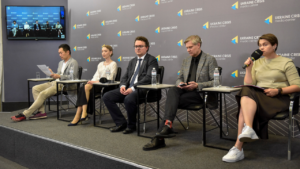How Russia Uses Courts to Persecute Ukrainians: Testimonies of Captivity, Torture, and Fabricated Sentences Heard in Helsinki
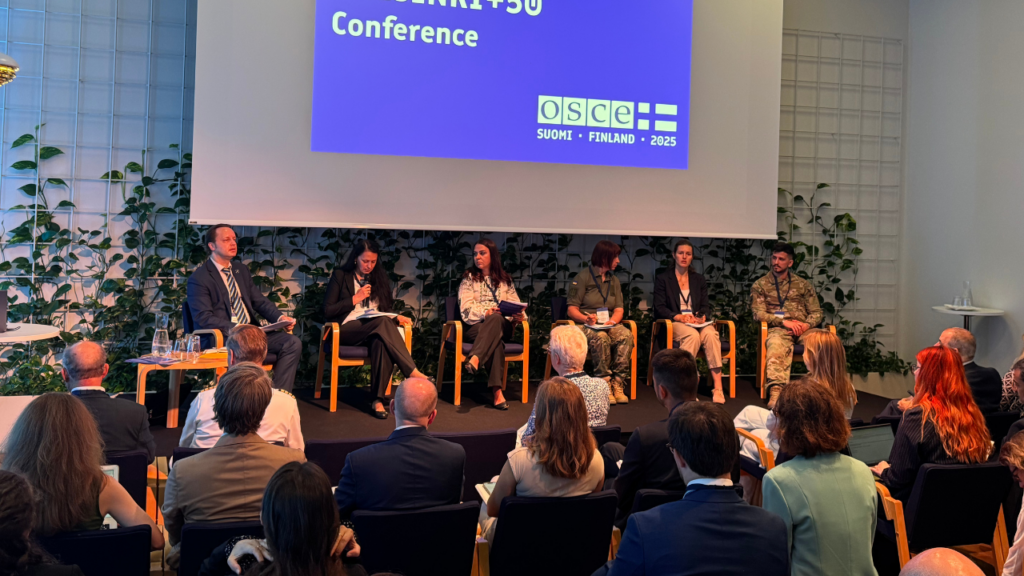
A high-level Helsinki+50 conference took place in Helsinki to mark the 50th anniversary of the signing of the Helsinki Final Act, which laid the foundation for the OSCE and for the first time enshrined human rights as a component of international security. At the same time, Russia’s full-scale war against Ukraine remains one of the gravest threats to security, the rule of law, and well-being in Europe. The same Russia that once participated in drafting the Helsinki Final Act today blatantly and systematically violates all of its core principles.
During the conference, the Media Initiative for Human Rights (MIHR), together with the ZMINA Human Rights Centre and the Permanent Mission of Ukraine to the International Organizations in Vienna, held a side event titled “The Future of the Helsinki Final Act: Restoring Justice and Holding Russia Accountable.” The discussion focused on Russia’s systemic and large-scale crimes against Ukrainian prisoners of war and civilians. Central to the discussion was Russia’s practice of denying the right to a fair trial through torture, fabricated charges, and sham judicial proceedings. Two former Ukrainian prisoners of war, who endured torture, inhumane conditions of detention, and pseudo-trials in Russian captivity, shared their testimonies.
The event was moderated by Yuriy Vitrenko, Permanent Representative of Ukraine to the International Organizations in Vienna. He stressed that Russia’s main target is people whose resistance it seeks to break.
“The level of cruelty displayed by the Russian army is shocking. It is cruelty fueled by systemic incitement to genocidal crimes — something we hear from the highest echelons of power in Russia. We must act now to protect our people and prevent new tragedies. If we want to restore respect for the principles of the Helsinki Final Act, we must ensure Russia is held accountable,” Vitrenko emphasized.
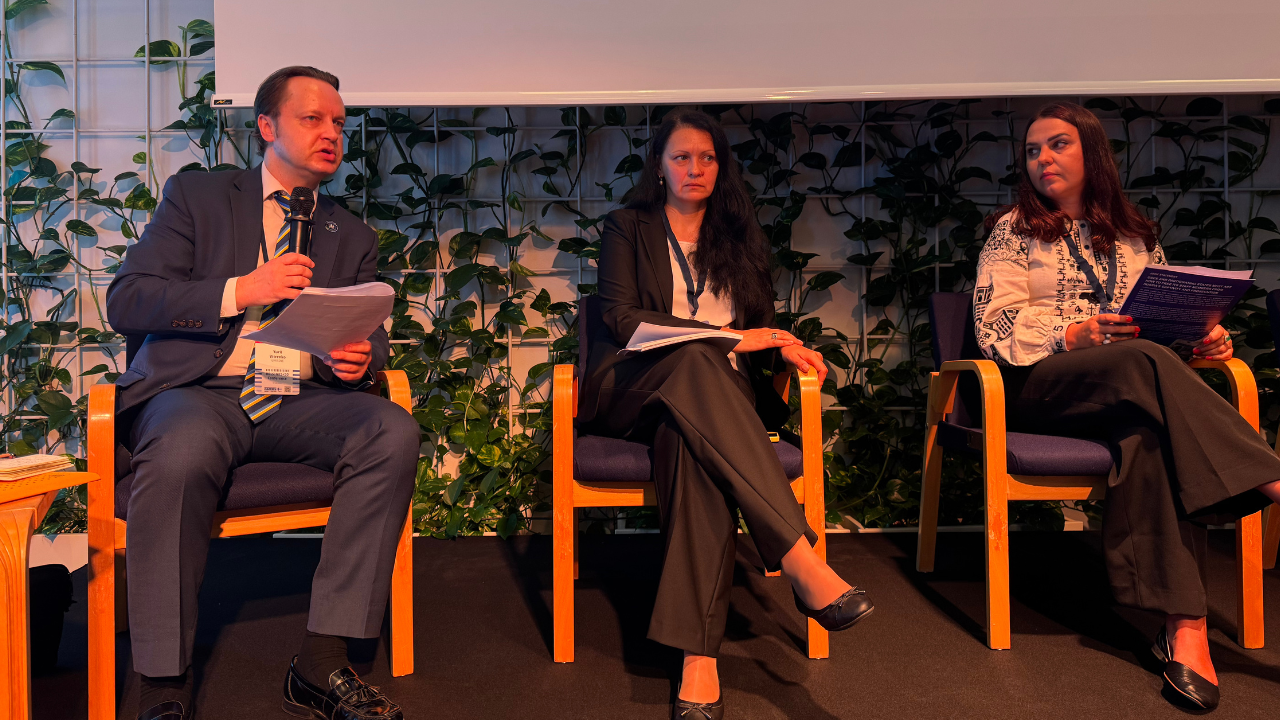
Yuriy Vitrenko (left), Permanent Representative of Ukraine to the International Organizations in Vienna
Russia fabricates terrorism charges against Ukrainians and uses torture to extract confessions to imaginary crimes against civilians. This is part of a broader campaign to discredit Ukraine and to construct an alternative legal reality that undermines Ukraine’s right to self-defense, questions the legitimacy of its resistance, and paints Ukraine as the aggressor allegedly committing war crimes.
“Russia has gathered hundreds, if not thousands, of so-called pieces of evidence of violations by Ukraine and has been issuing verdicts for years. The time will come when it will open this massive chest of pseudo-documents and try to present itself as a victim,” stressed Tetiana Katrychenko, Head of MIHR. “Even now, Russia is trying to use in absentia verdicts as a tool to persecute Ukrainians beyond its territory. That is why it is crucial to talk about these processes today — to expose Russia’s criminal intentions. It is equally important to ensure that Russian court rulings against Ukrainian POWs and civilians are recognized as invalid. Russia is persecuting hundreds of civilians not only on its own territory but also in the occupied areas, where illegal courts have been set up.”
Courts under Russian control systematically ignore the context of international armed conflict in criminal cases. Thus, Russia exploits “justice” as a tool of revenge, punishment, and propaganda. Ukrainian POWs are prosecuted on charges of “terrorism” or participation in “illegal armed groups,” while in reality they are engaged in lawful armed resistance protected by international humanitarian law. Civilians are accused of espionage, sabotage, or possession of weapons — often simply for their pro-Ukrainian stance or refusal to collaborate with occupying authorities.
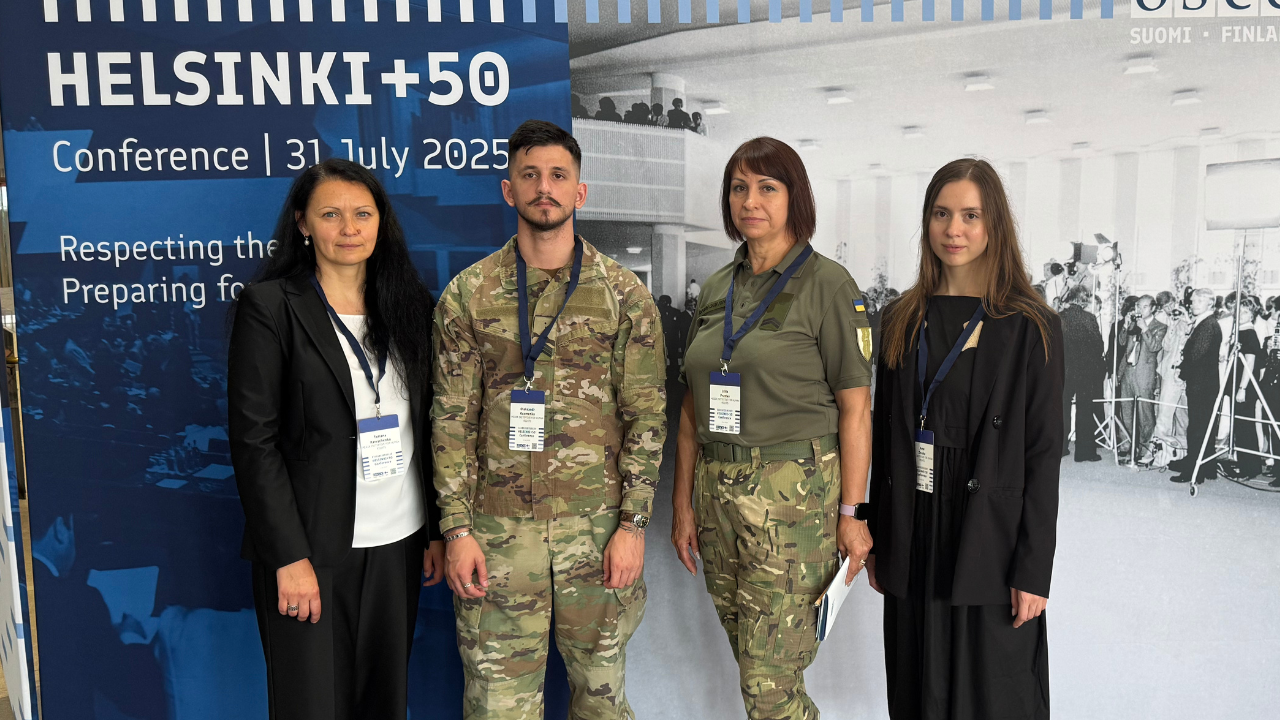
Tetiana Katrychenko (left), Head of MIHR, Anna Zevako (right), Advocacy Manager at MIHR, and witnesses
Tetiana Pechonchyk, Chair of ZMINA, noted:
“Trials of Ukrainian civilians and POWs in the Russian Federation and in occupied territories do not meet the standards of the right to a fair trial — equality of arms, evaluation of evidence, exclusion of evidence obtained under torture, the right to defense, presumption of innocence, openness of proceedings, and more. Russian judges, prosecutors, and investigators involved in this are as much war criminals as those who abduct, torture, and rape Ukrainian citizens. Russia’s so-called judicial system is yet another element of its overall criminal enterprise.”
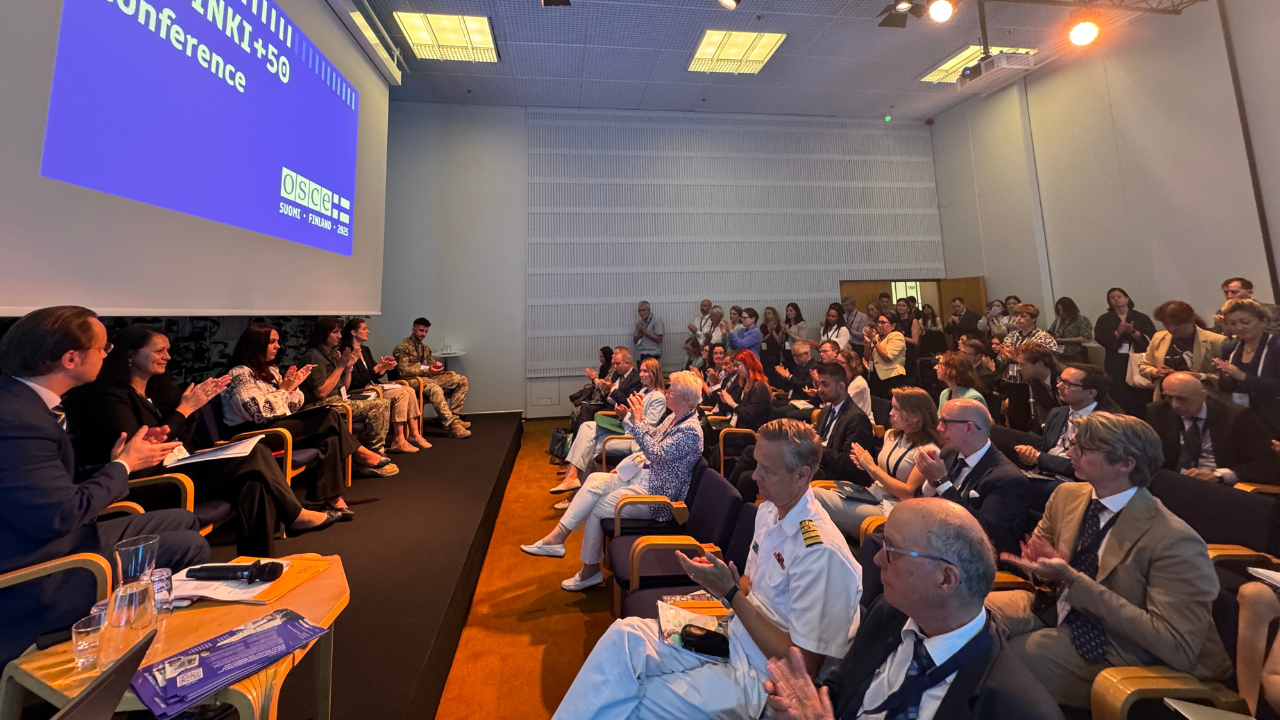
Speakers and audience applaud after the panel discussion
She also recalled the case of OSCE Special Monitoring Mission members Vadym Holda, Maksym Petrov, and Dmytro Shabanov, who were detained in April 2022 in Donetsk and Luhansk, convicted of “treason” and “working for US intelligence,” and sentenced to 13–14 years in prison. They were tortured, held in inhumane conditions, and denied proper medical care.
Former POW Liliia Prutian, a soldier of Ukraine’s 24th Aidar Assault Battalion, was falsely charged with terrorism. She was held for over a year in a basement of a pre-trial detention center in Donetsk before being transferred to a so-called court in Rostov, where illegal proceedings were launched against her. Her testimony illustrates Russia’s fabrication of criminal cases through torture, pressure, and intimidation.
Captured in March 2022, all the men in her group were executed. Only a few medics, including her, survived.
“From the very first day of captivity, I was treated extremely harshly. For three days, I was kept in a vehicle without food or water,” Liliia recalled. “Later, I was moved to Olenivka prison. I could hear others being tortured nearby. It caused immense psychological suffering.”
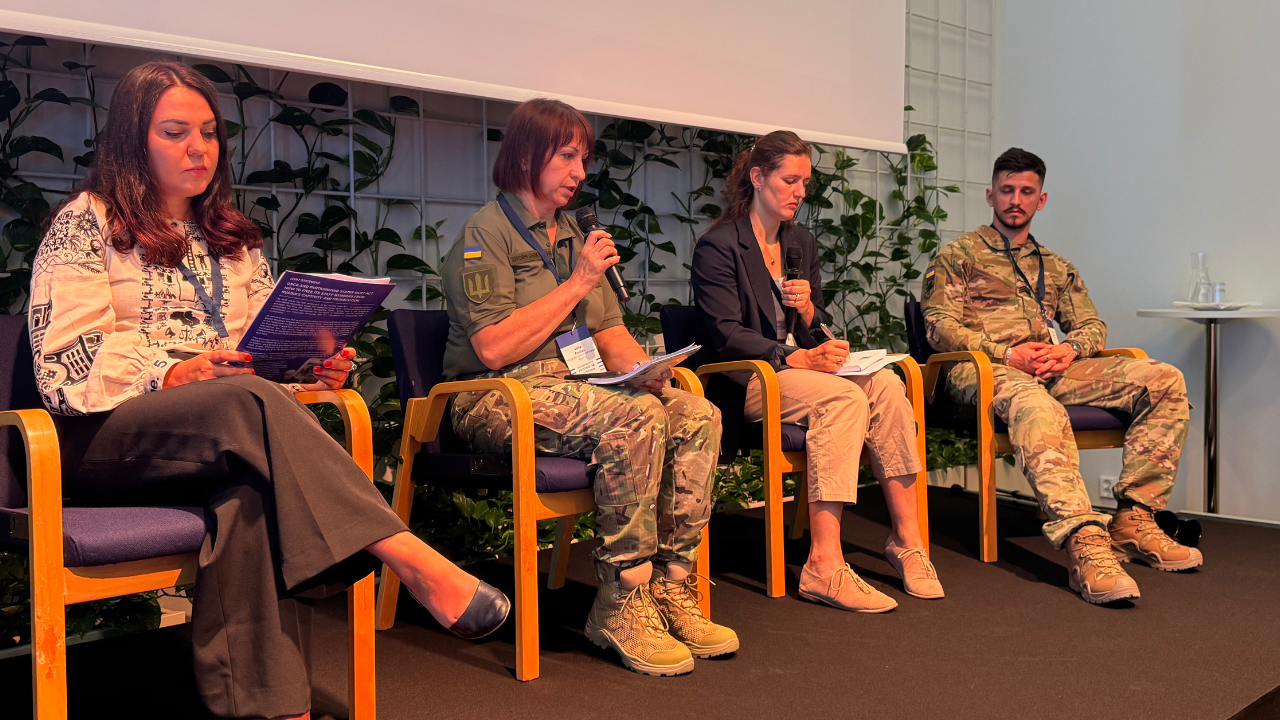
Liliia Prutian (second from left), servicewoman of the 24th Aidar Separate Assault Battalion of the Ukrainian Ground Forces
During interrogations, she was forced to sign a confession to terrorism:
“I was taken to an investigator and told to confess that I was a terrorist. I refused. I wrote something, but not what they wanted. Then they put a bag over my head, took me to Donetsk SIZO, and forced me to crawl down stairs while beating me with batons. The pain was unbearable. Another time, I was locked in a small cage-like room, one hand cuffed, while a huge dog barked and lunged at me. In such conditions, it is impossible not to sign what they demand.”
Liliia was released in a prisoner exchange in September 2024. While grateful, she stressed that many of her comrades remain in captivity, prosecuted simply for defending their homes.
Oleksandr Kuzmenko, a sergeant with the Azov Brigade of the National Guard of Ukraine, spent two and a half years in captivity and was sentenced by a so-called Russian court to 25 years in a high-security colony. Captured during the defense of Mariupol, he was gravely wounded.
“I spent a year and a half in a hospital of the so-called ‘DPR.’ At first we were treated, then we were beaten. All the ‘treatment’ was accompanied by torture from FSB and Investigative Committee officers. I was tortured for three days straight to force me to confess to killing a civilian. Obviously, I hadn’t done it, but to survive I had to invent a crime so they wouldn’t torture me further,” Oleksandr said.
His trial was a complete farce: a single session ended with a 25-year sentence. His health condition was ignored, no evidence or witnesses were presented, and the court-appointed “lawyer” played a mobile game during the hearing.
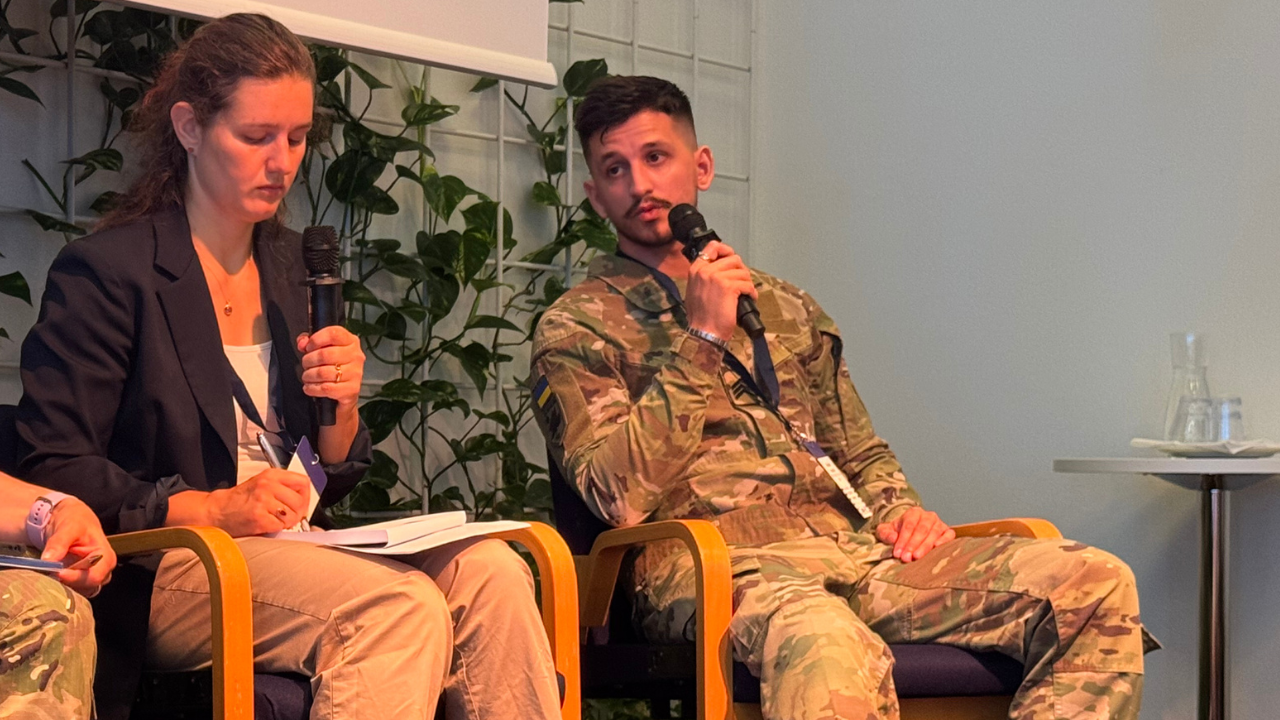
Oleksandr Kuzmenko (right), sergeant of the Azov Brigade of the National Guard of Ukraine
He spent six months in a high-security colony before being released in an October 2024 exchange. He calls it the happiest day of his life, but stresses the importance of fighting for others:
“Hundreds of Ukrainian POWs remain in Russian prisons and in occupied territories, sentenced on fabricated, absurd charges. None of these crimes were committed. This category of captives suffers the harshest conditions. I hope advocacy for their release will grow louder internationally.”
On the sidelines of the conference, Ukraine’s Foreign Minister Andrii Sybiha met with Ukrainian servicemen and personally thanked them for their service:
“Their strength, dignity, and unbreakable spirit in the face of such cruelty are truly inspiring. I am glad that their powerful testimonies were heard at Helsinki+50, reminding the international community of the human cost of Russian aggression and the urgent need for justice and accountability,” the minister said.
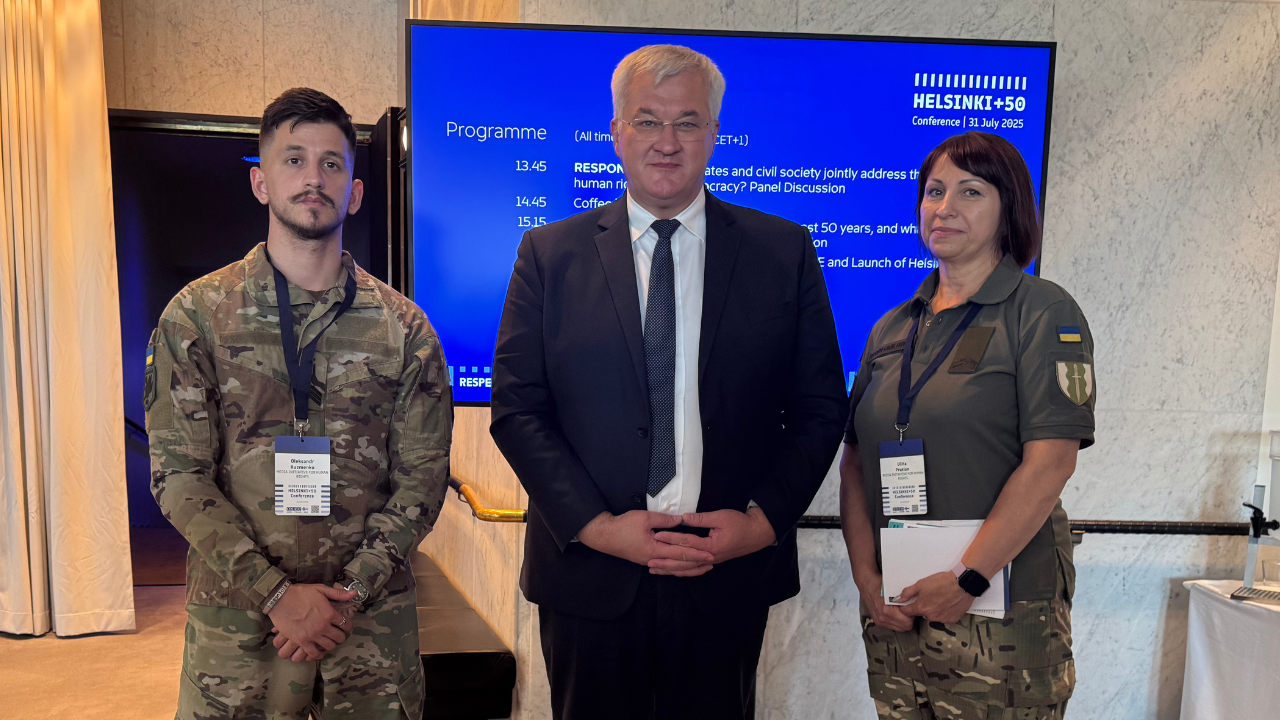
Andrii Sybiha (center), Minister of Foreign Affairs of Ukraine
During the conference, MIHR also held bilateral meetings with OSCE missions, calling to delegitimize Russia’s politically motivated verdicts, prevent their enforcement in third countries, secure international observers’ access to courts, and expose Russia’s attempts to portray itself as a victim while weaponizing “justice” to cover aggression.
The trip was supported financially by the Czech organization People in Need under the SOS Ukraine initiative. The content of the publication does not necessarily reflect their views.



